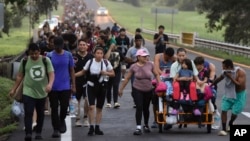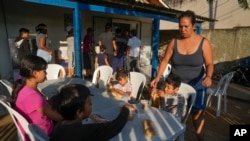As G20 leaders convened in Rio de Janeiro, Brazil, in November, they set an ambitious goal to lift 600 million people out of poverty by 2030, highlighting the urgent need to address poverty and global health care — the root causes of migration and forced displacement.
During the summit, experts said the world's 20 largest economies have the capacity to lessen the impact of the root causes through social policies and regional migration agreements.
Experts like Paulo Illes, founder of the Center for Immigrant Human Rights and Citizenship, emphasized the importance of recognizing migration issues as legitimate.
“That must always be addressed from a human rights perspective,” Illes told VOA. “Additionally, G20 leaders should acknowledge that migration also occurs due to structural issues such as poverty, environmental disasters, wars and conflicts.”
Euclimar Fuentes, a Venezuelan migrant living in Sao Paulo, Brazil, is an example of how these issues converged. Born in Venezuela, Fuentes remembers a happy childhood there.
“We would go to the beach for breakfast as a family. Culturally, life was beautiful in Venezuela,” she told VOA.
Her father’s retirement after years as a police officer gave the family a comfortable life. The situation in Venezuela deteriorated during the COVID-19 pandemic because of a combination of preexisting economic, political and social crises compounded by the global health emergency.
“It’s difficult when a family, a whole community, is left without food, electricity, energy or water. It’s hard to live in a country where you have nothing to eat,” Fuentes said.
Her family’s challenges intensified when her son was diagnosed with leukemia in December 2020.
“We tried to treat him there, but it was hard,” she told VOA, adding that many children died in the same circumstances: no resources, no treatment, nothing to eat.
“We didn’t want him to be part of that system [and die],” she said.
On December 26, 2020, Fuentes and her family left Venezuela.
They considered different countries, including the United States, but because of her son’s illness and the path for humanitarian status, they chose Brazil, which according to the United Nations High Commissioner for Refugees is home to about 61,000 Venezuelans.
G20 declaration
The G20’s official declaration highlighted the need to address the root causes of displacement, including hunger and poverty.
The U.N. estimates that 2.4 billion people worldwide live in poverty, a crisis that has increased migration, Brazilian Development Minister Wellington Dias said.
“But beyond the migration issue,” Dias told VOA, “Hunger and poverty are not just problems for those who are hungry or living in poverty. It’s a problem for the middle class, for the wealthy, for rich countries and for wealthy individuals.”
The declaration included creating the Global Alliance Against Hunger and Poverty, which aims to implement policies such as cash transfers to 500 million people, school meals for 150 million children, and health services for 200 million women and young children.
Funding is expected to come from at least 40 nations, 13 global organizations and various nonprofits and foundations, managed through several financial institutions.
“It’s no longer just giving food baskets,” Dias said. “We are talking about implementing a development plan that must address education, which is a key foundation for eradicating poverty, as well as health, the economy, job creation and infrastructure.”
The U.N. noted that food insecurity, migration and displacement are intricately linked to climate change, natural disasters, conflicts and poverty — all major conversations at the G20 summit. The challenges faced during the COVID-19 pandemic further highlighted these connections, with health crises, economic hardship and displacement driving increased migration in the Western Hemisphere, Dias said.
Steve Seide, a 22-year-old political science student from Haiti, also embodied the struggles faced by many migrants. He left his homeland in 2023 because of a lack of jobs and increasing security concerns.
“I chose Brazil because I heard of work opportunities and how welcoming Brazilian people are,” he told VOA.
Seide’s journey to Brazil was dangerous and expensive. To reach his destination, he crossed without documentation into the Dominican Republic.
“The first time, I did not get in. But I went back to the border,” he said.
After spending a month in the Dominican Republic, he eventually secured a humanitarian visa and is on a path to a stable life in Brazil.
“In life, you can’t stop. If you need to get somewhere, you have to fight until the end,” he said.
Future response efforts
The global response to the pandemic also took center stage at the G20 summit, where the United States spearheaded efforts to secure new contributions toward a $2 billion pandemic fund, pledging up to $667 million by 2026.
The goal is to help developing countries prepare for and respond to future pandemics. However, U.S. participation in this initiative is subject to congressional approval.
Member countries also agreed to establish “a governance mechanism that integrates the key players in the global health security and financing ecosystem, with the World Health Organization at the center.”
As G20 leaders sought to address the interconnected challenges of migration, poverty and global health, stories like those of Fuentes and Seide underscored the importance of international cooperation and sustainable solutions.
“When you have your home, your piece of land, your family, you don’t think about leaving,” Fuentes said, adding that being separated from her loved ones is still “very hard.”
“It’s been three years, but it’s still hard. Leaving everything behind, not knowing when you’ll see your loved ones again — it’s a pain that doesn’t go away. … Leaving was the hardest thing we’ve ever done. But sometimes, it’s the only choice you have to protect who you love,” she said.






